必修一unit2学案
- 格式:pdf
- 大小:321.28 KB
- 文档页数:10
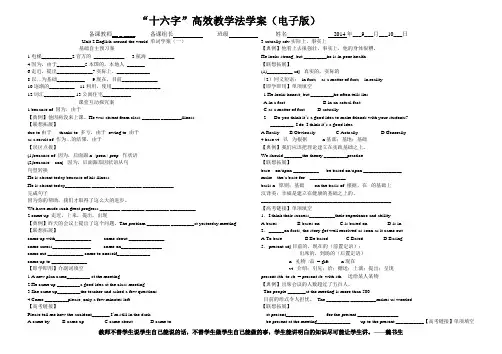
Unit 2 English around the world 单词学案(一)基础自主预习案1.电梯____________2.官方的____________3.航海__________4.因为,由于___________5.本国的,本地人_______6.走近,提出______________7.实际上,_____________8.以…为基础___________ 9.现在,目前______________10.逐渐的__________ 11.利用,使用___________________12.词汇____________ 13.公寓住宅___________课堂互动探究案1.because of 因为,由于【典例】他因病没来上课。
He was absent from class _______ ________illness.【联想拓展】due to由于thanks to 多亏,由于owing to 由于as a result of 作为…的结果,由于【误区点拔】(1)because of 因为,后面跟n. /pron./ prep. 作状语(2)because conj. 因为,后面跟原因状语从句句型转换He is absent today because of his illness.He is absent today__________ _________ __________ ____________.完成句子因为你的帮助,我们才取得了这么大的进步。
We have made such great progress ________ _________ _________ __________ .e up 走近,上来,提出,出现【典例】昨天的会议上提出了这个问题。
The problem _________ _________at yesterday meeting. 【联想拓展】come up with______________ come about ______________come across_______________ come on________________come out ______________ come to oneself_____________come up to ______________【即学即用】介副词填空1.A new plan came_________ at the meeting.2.He came up _________a good idea at the class meeting.3.She came up_________the teacher and asked a few questions.e _________please, only a few minutes left.【高考链接】Please tell me how the accident_______.I’m still in the dark.A.came byB.came upC.came aboutD.came to 3.actually adv.实际上,事实上【典例】他看上去很强壮,事实上,他的身体很糟。
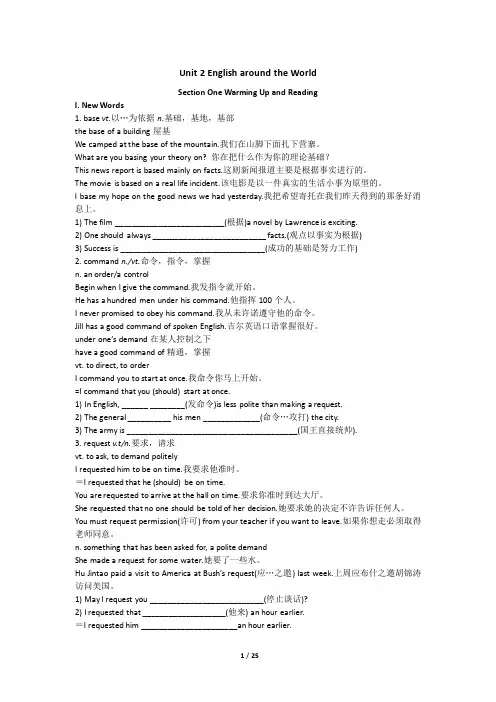
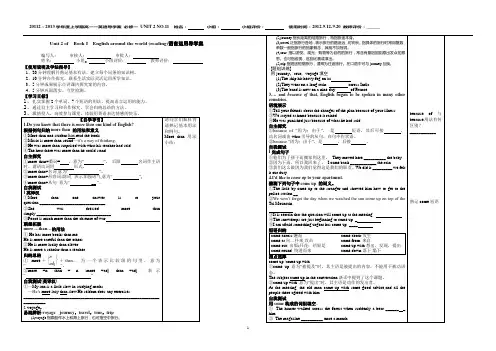
Unit 2 of Book I English around the world (reading)语言运用导学案编写人: 审核人: 审批人:姓名: 小组: 小组评价: 教师评价: 【使用说明及学法指导】1、20分钟理解并熟记基本有法,建立每个词条的知识树。
2、10分钟合作探究,联系生活实际灵活运用所学知识。
3、5分钟成果展示点评课内探究案的内容。
4、5分钟巩固落实、当堂检测。
【学习目标】1、扎实掌握2个单词、7个短语的用法,提高语言运用的能力。
2、通过自主学习和合作探究,学会归纳总结的方法。
3、激情投入,高效参与课堂,体验用英语表达情感的快乐。
【自学导引】 1.Do you know that there is more than one kind of English? 根据例句归纳more than 的用法和意义 ①More than one student has read the book. ②Music is more than sound —it’s a way of thinking.③He was more than surprised with what his teacher had said.④The heat there was more than he could stand.自主探究①more than+数词= ,意为“ ”, 后跟 名词作主语时,谓语动词用 形式。
②more than+名词,意为“ ”。
③more than+形容词/副词, 表示加强语气,意为“ ”。 ④more than+从句 意为“ __ ”。
自我测试 I 英译汉①More than one answer is to yourquestion.______________________________②She was dressed more than simply.__________________________________③Peace is much more than the absence of war. 联想拓展 more …than…的用法 ① He has more books than me. He is more careful than the others.②He is more lucky than clever.He is more a scholar than a teacher.归纳总结 ① more +⎩⎨⎧⎭⎬⎫n .adj .+than… 为一个表示比较级的句型,意为“ ”。
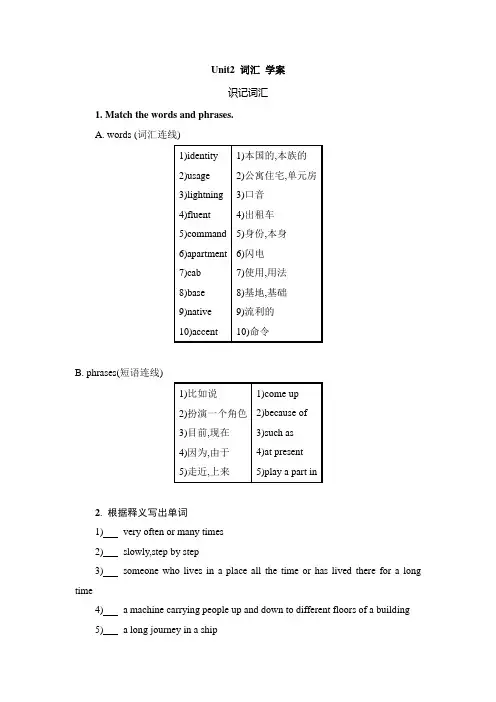
Unit2 词汇学案识记词汇1. Match the words and phrases.A. words (词汇连线)1)identity2)usage3)lightning4)fluent5)command6)apartment7)cab8)base9)native10)accent 1)本国的,本族的2)公寓住宅,单元房3)口音4)出租车5)身份,本身6)闪电7)使用,用法8)基地,基础9)流利的10)命令B. phrases(短语连线)1)比如说2)扮演一个角色3)目前,现在4)因为,由于5)走近,上来1)come up2)because of3)such as4)at present5)play a part in2. 根据释义写出单词1)very often or many times2)slowly,step by step3)someone who lives in a place all the time or has lived there for a long time4) a machine carrying people up and down to different floors of a building5) a long journey in a ship6) a word or phrase with a particular meaning7)the distance along a city street from where one street crosses it to the next8)in fact9)able to speak a language well10)all the words that someone knows, learns,or uses精讲词汇1. voyage,journey,trip,tour,travel【完成句子】1)He went on a around the world. 他去做环游世界的旅行。
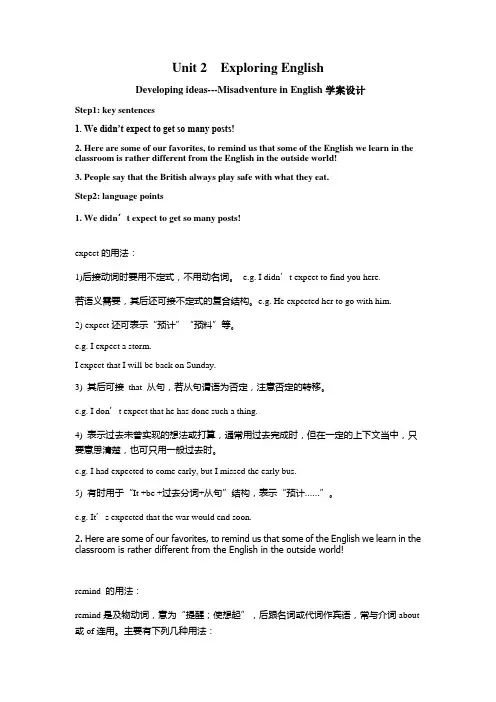
Unit 2 Exploring EnglishDeveloping ideas---Misadventure in English学案设计Step1: key sentences1. We didn’t expect to get so many posts!2. Here are some of our favorites, to remind us that some of the English we learn in the classroom is rather different from the English in the outside world!3. People say that the British always play safe with what they eat.Step2: language points1. We didn’t expect to get so many posts!_____________________________________________________________________ expect的用法:1)后接动词时要用不定式,不用动名词。
e.g. I didn’t expect to find you here.若语义需要,其后还可接不定式的复合结构。
e.g. He expected her to go with him.2)expect还可表示“预计”“预料”等。
e.g. I expect a storm.I expect that I will be back on Sunday.3) 其后可接that 从句,若从句谓语为否定,注意否定的转移。
e.g. I don’t expect that he has done such a thing.4) 表示过去未曾实现的想法或打算,通常用过去完成时,但在一定的上下文当中,只要意思清楚,也可只用一般过去时。
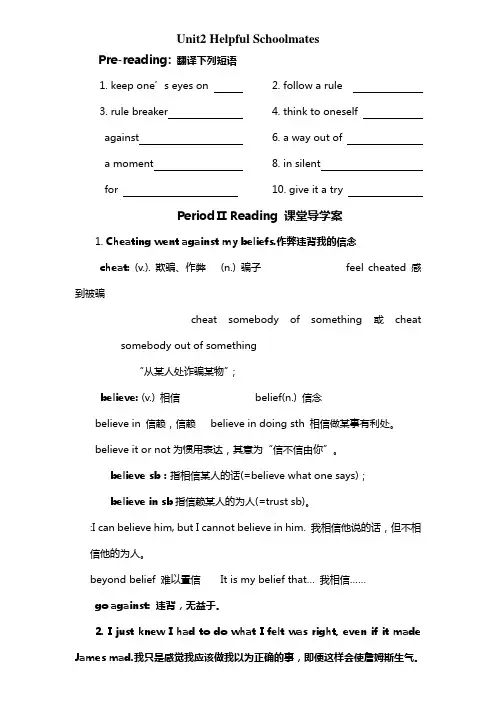
Unit2 Helpful SchoolmatesPre-reading: 翻译下列短语1. keep one’s eyes on2. follow a rule3. rule breaker4. think to oneselfagainst 6. a way out ofa moment 8. in silentfor 10. give it a tryPeriodⅡ Reading 课堂导学案1. Cheating went against my beliefs.作弊违背我的信念cheat:(v.). 欺骗、作弊(n.) 骗子feel cheated 感到被骗cheat somebody of something 或cheat somebody out of something“从某人处诈骗某物”;believe: (v.) 相信belief(n.) 信念believe in 信赖,信赖believe in doing sth 相信做某事有利处。
believe it or not为惯用表达,其意为“信不信由你”。
believe sb:指相信某人的话(=believe what one says);believe in sb指信赖某人的为人(=trust sb)。
:I can believe him, but I cannot believe in him. 我相信他说的话,但不相信他的为人。
beyond belief 难以置信It is my belief that…我相信……go against: 违背,无益于。
2. I just knew I had to do what I felt was right, even if it made James mad.我只是感觉我应该做我以为正确的事,即便这样会使詹姆斯生气。
mad: (adj.) 疯狂的=crazy go mad 发疯be mad about…对……狂热drive sb mad逼得某人发疯be mad at sb. 对某人很恼火be mad about\ on sb 迷恋某人like mad 疯狂地3. So I guarded my paper so that he couldn’t see my answers. 因此,我护着我的试卷,使他不能看到我的答案。

Unit2 English Around the World (学案)Period 1 Warming-up&reading◆Learning Aims(学习目标):1.知识目标:了解英语语种,拓宽学习视野,积累学科知识。
2.能力目标:训练阅读理解,培养阅读技能,增强阅读能力。
3.情感目标:胸怀爱国理念,树立高考意识,励志学好英语。
◆Key and Difficult Points(学习重难点):1.了解现代英语极其发展历程。
2.训练和培养英语阅读的方法与技巧。
◆Learning Methods(学习方法):1.查阅与积累2.自主学习与小组合作◆Learning Procedures(学习步骤):▼Finding before class(课前“百度”)Solve the following questions in some possible ways,such as going online、asking others or going to the library.Q1:How many languages are there in the world?Key:Q2:Which language is the most widely used language in the world?Key:▼Collecting in class(课堂记录)Collect some important information showsed by the teacher in class.Q1:Have you seen the word “Englishes”?Do you know the meaning of it?Key:Q2:Do you know the differences between BE and AE?What are the differences?Key:▼Self-learning(自主学习)Read the text according to the guide steps below and try to finish some related tasks.Step1 New words and phrases ( 熟悉新词)Step2 Guessing ( 猜词∕句子)Look at the title of the reading passage and then do the following exercise.Ex1.The word “road”means .The passage probably talks aboutStep3 Skimming(略读)Skim the passage and try to find out the topic sentence of each paragraph ,then underline them in your text book.Step4 Fast-reading(快读)Read the whole passage quickly ,then match the main idea of each part.Part1(Para1) A.English is spoken as a foreign language or secondlanguage in Africa and Risa.Part2(Para2) B.The spread of the English language in the world Part3(Para3-4) C.Native speakers can understand each other easily Para4(Para5) D.All languages change when cultures communicatewith one anotherStep 5 Careful-reading(细读)1.Read part(para1) and answer the following questions.Q1: How many people speak English at the end of the 16C?Key;Q2:Why did English begin to be spoken in many other countries in the 17 century? Key:2.Read part2(para2)and translate the first sentence into Chinese.Key:3.Read Part3(Para3-para4)and finish the following tasks.Task1:Choose the best answer according to the text.① Which statement is true?A. Languages always stay the same .nguages change only after warsnguages no longer changenguages change when cultures change②From AD450 to 1150 English sounded more like .A.FrenchB.ChineseC.GermanD.Russion③Who moved to America and then Australia?A.German settlersB.French settlersC.British settlersD.Danish settlers④ When was the English language finally settled?A.By the 19th centuryB.By the 18th centuryC.By the 1600’sD.At the end of the 17th century4.Read part 4(para5) and do the ture (T)or false(F) exercise.①English now is spoken as official language in South Asia.( )②India has the largest number of fluent English speakers.( )③Britain ruled India from 1765 to 1947.( )④Today the number of people learning English in China is growing rapidly.( )⑤China has the largest number of English learners.( )▼Cooperation(合作探究)1.Work with your members in your group to fill the blanks in the table below.The Road to Modern English▼Thinking after class (课后思考)1.Discussion:Will Chinese English become one of the world Englishes?2..Find the important and difficult words、phrases and sentences in the passage.。
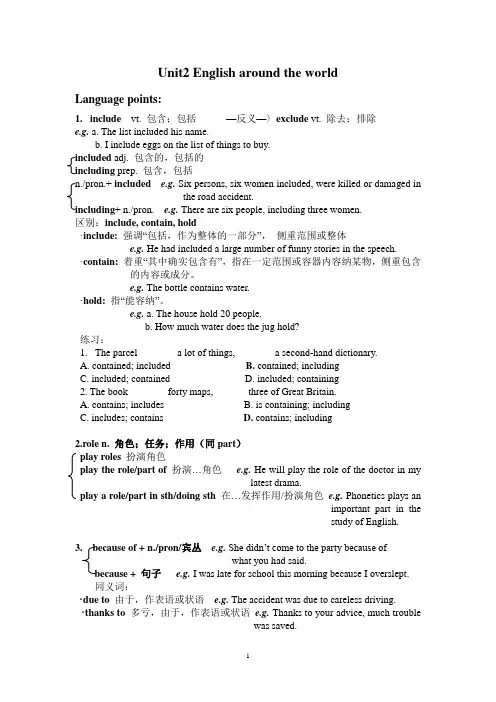
Unit2 English around the worldLanguage points:1.include vt. 包含;包括—反义—〉exclude vt. 除去;排除e.g.a. The list included his name.b. I include eggs on the list of things to buy.adj. 包含的,包括的prep. 包含,包括included e.g. Six persons, six women included, were killed or damaged inthe road accident.+ n./pron. e.g. There are six people, including three women.区别:include, contain, hold·include:强调“包括,作为整体的一部分”,侧重范围或整体e.g.He had included a large number of funny stories in the speech. ·contain:着重“其中确实包含有”,指在一定范围或容器内容纳某物,侧重包含的内容或成分。
e.g. The bottle contains water.·hold:指“能容纳”。
e.g. a. The house hold 20 people.b. How much water does the jug hold?练习:1.The parcel _______ a lot of things, _______ a second-hand dictionary.A. contained; includedB. contained; includingC. included; containedD. included; containing2. The book _______ forty maps, ______ three of Great Britain.A. contains; includesB. is containing; includingC. includes; containsD. contains; including2.role n. 角色;任务;作用(同part)play roles扮演角色play the role/part of 扮演…角色 e.g. He will play the role of the doctor in mylatest drama.play a role/part in sth/doing sth在…发挥作用/扮演角色e.g.Phonetics plays animportant part in thestudy of English.3. because of + n./pron/宾丛 e.g.She didn’t come to the party because ofwhat you had said.because + 句子 e.g. I was late for school this morning because I overslept.同义词:·due to 由于,作表语或状语 e.g. The accident was due to careless driving. ·thanks to多亏,由于,作表语或状语e.g. Thanks to your advice, much troublewas saved.·owing to 由于,作表语或状语e.g. Tom’s failing in the exam was owing to hiscarelessness.·as a result of由于,作状语e.g.The flight was delayed as a result of fog.·on account of 因为,作状语e.g. We delayed our departure on account of the badweather.·by reason of 由于,因为,作状语e.g.He was excused by reason of his age.4. native adj.&n.①adj. a. 出生地的b. 本地的,土生土长的c. (常与to连用)本地产的A是B地特产的动物或植物:A be native to B. = A be a native of B.d.(指品质)与生俱来的,天生的②n. 本地人,本国人,某地的动物或植物e.g. a. Her native tongue is German.b. Tom is a native Englishman.c. Banana is native to Taiwan.== Banana is a native of Taiwan.d. native speakerf. He is a native of Beijing.g. Are you a native here, or just a visitor?h. The panda is a native of west China.注:One’s native place 指某人的出生地,但表达“是某地人”时,习惯上不说“My native place is …..”而说“I was born in ……”拓展:n.国家,民族national adj. 国家的,国民的n(c). 侨民n. (u) 国籍(c)民族 e.g. the minority nationalities 各少数民族5. the road to the modern Englishto 为介词,类似的有:the entrance to the hallthe answer(n.) to the question answer(v.) the questionthe key to the doora road to successa journey/trip to Beijing a visitor to Beijingthe guide to ….the notes to the textan introduction to English grammar6. not 与everything 连用表示部分否定类似的:all, both, every, whole, always, altogether, entirely, wholly 等与否定词连用,构成部分否定。
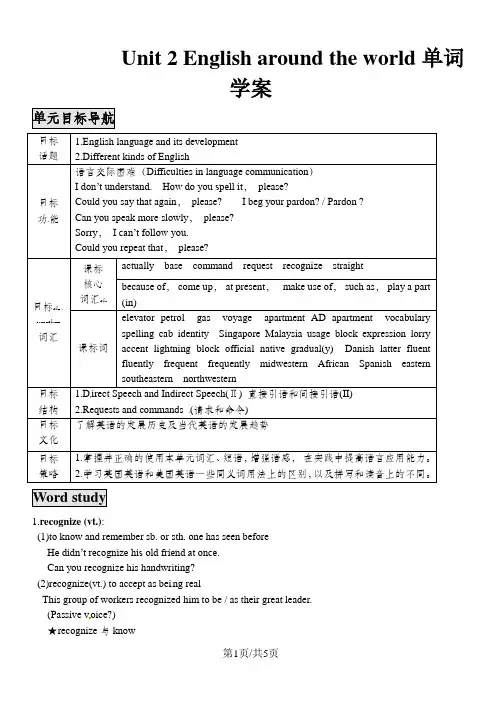
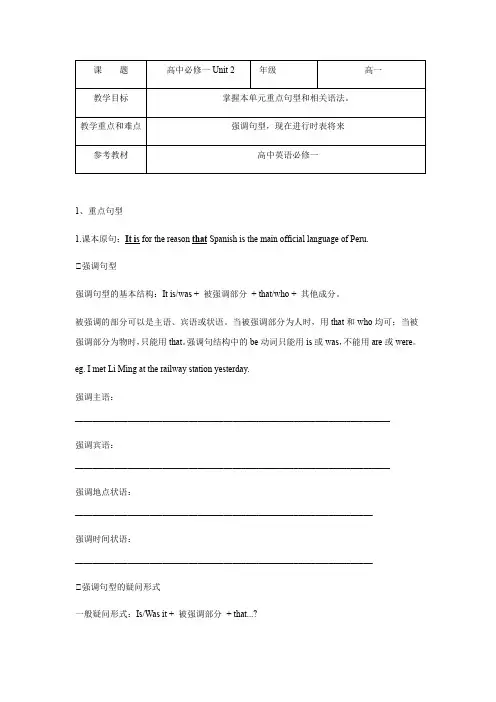
1、重点句型1.课本原句:It is for the reason that Spanish is the main official language of Peru.①强调句型强调句型的基本结构:It is/was + 被强调部分+ that/who + 其他成分。
被强调的部分可以是主语、宾语或状语。
当被强调部分为人时,用that和who均可;当被强调部分为物时,只能用that。
强调句结构中的be动词只能用is或was,不能用are或were。
eg. I met Li Ming at the railway station yesterday.强调主语:________________________________________________________________________强调宾语:________________________________________________________________________强调地点状语:____________________________________________________________________强调时间状语:____________________________________________________________________①强调句型的疑问形式一般疑问形式:Is/Was it + 被强调部分+ that...?特殊疑问形式:特殊疑问词+ is/was it that...?eg. Was it on January 3,2019 that the Chang’e-4 probe succeeded in landing on the moon’s far side?Where was it that you picked up the wallet?2.课本原句:Enjoy the beautiful countryside as you spend a day driving along the new highway connecting Cusco to Lake Titicaca.①as引导的时间状语从句当as引导时间状语从句时,意为“随着...;当...时”。
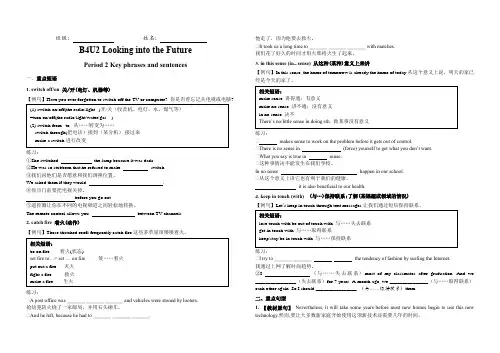
班级:姓名:B4U2 Looking into the FuturePeriod 2 Key phrases and sentences一.重点短语1.switch off/on 关/开(电灯、机器等)【例句】Have you ever forgotten to switch off the TV or computer? 你是否曾忘记关电视或电脑?练习:②He was so stubborn that he refused to make switch.③我们问他们是否愿意和我们调换位置。
We asked them if they would.④你出门前要把电视关掉。
before you go out.⑤遥控器让你在不同的电视频道之间轻松地转换。
2.catch fire 着火(动作)【例句】These thatched roofs frequently catch fire.这些茅草屋顶屡屡着火。
练习:①A post office was _______ _______ _______ and vehicles were stoned by looters.抢劫犯防火烧了一家邮局,并用石头砸车。
①And he left, because he had to _______ _______ _______.他走了,因为他要去救火。
①It took us a long time to _______ _______ _______ with matches.我们花了好久的时间才用火柴将火生了起来。
3.in this sense (in...sense) 从这种(某种)意义上来讲【例句】In this sense, the home of tomorrow is already the home of today.从这个意义上说,明天的家已经是今天的家了。
练习:① makes sense to work on the problem before it gets out of control.①What you say is true in sense.①这种事情决不能发生在我们学校。
Unit 2 ReadingText 1课前预习一、课文理解1、What’s the main idea of the passage?2、How many parts the passage can be divided into.A、2B、3C、4D、53、Which sentence in the passage can be replaced by the following one?In the 1600s ,be cause English people made voyages and conquered other parts of the world people in many other countries began to speak English.4、When did English begin to become .Indian official language?A、TodayB、from 1765 to 1947C、by the 19th centuryD、about the middle of 18th century5、Translate the sentence into Chinese.Native English speakers can understand each other Even if they don’t speak the same kind of English.二、基础知识短语英汉互译1、通向现代英语之路2、海上航行3、很多其他的国家4、than ever before5、come up to one’s apartment6、以…为基础7、at present8、rule9、enrich10、a wider vocabulary三、Translate the sentences and recite1、如今说英语的人比以往任何时候都多了,他们有的是作为第一语言来说。
必修Book 1 Unit 2 English around the world 语法导学案编写人:审核人:审批人:【学习目标】1、理解并掌握直接引语和间接引语用法。
2、运用直接引语和间接引语完成句子。
3、用饱满的激情疯狂记忆,挑战自我,积极展示,享受学习的快乐。
【使用说明及学法指导】仔细阅读语法细则,用红笔标出重点AB层完成所有认为,C层选当堂检测部分。
直接引语和间接引语(Ⅱ)语法规则(祈使句改为间接引语)1.根据祈使句的语气,如果是强制性的,如军官、警官对下级,老板对雇员等,把say改为order或demand;如是同级之间一般性的语气,则改为tell;如遇客气的请求,则改为ask,但时态均不变。
2.把祈使的对象放在order,demand,tell,ask后面,作其宾语。
3.把祈使句的动词原形改为不定式to do 或not to do,放在宾语后面,并去掉引号。
4. 如祈使句中有代词,要视具体情况作相应的变化,如your→his/her,this→that,总的原则是使所指不变。
5.祈使句改为间接引语后,成了一个简单句子,整个句子结构为:主语+order/demand/tell/ask+sb.+to do/not to do sth.。
“Take off your boots!”the guard said to Hill.→The guard ordered Hill to take off his boots.Mrs.Black said to the students angrily,“Don’t make any noise!”→Mrs.Black ordered the students not to make any noise.Father said to me,“Look after your little sister.”→Father told me to look after my little sister.“Please help me carry this box,”she said to John.→She asked John to help her 扎实记住这些规律,然后用这些规律解答实际题目扎实记住这些规律,然后用这些规律解答实际题目carry that box.【拓展】直接引语若为祈使句(通常表示命令、要求、建议等),变为间接引语时,常构成简单句型“引述动词ask/tell/order/advise/warn/remind/etc.+名(代)词宾语+(not)不定式”。
1.argue v i.争吵,争辩,争论v t.说理,论证→argument n.争吵,争论;论点2.anxiety n.担心;焦虑;渴望→anxious adj.忧虑的,担心的;令人焦虑的;渴望的3.anger n.怒气,怒火→angry adj.生气的;恼火的4.concern n.担心,忧虑;关心v t.涉及;让(某人)担忧→concerned adj.担心的,忧虑的;关注的,关切的5.stress n.精神压力,紧张;强调v t.强调,着重→stressed adj.紧张的;有压力的6.edit v.编辑→editor n.主编,编辑;剪辑师→edition n.版本;版次1.shoot vi.&vt.(使朝某方向)冲,奔;射击;射杀;摄影①Three people were shot dead during the robbery. 射杀②The movie was shot in New Zealand. 摄影③They had almost reached the boat when a figure shot past them.(使朝某个方向)冲,奔2.spot n.粉刺;斑点;污渍;地点,场所①She was wearing a black skirt with white spots. 斑点②His jacket was covered with spots of mud. 污渍③The baby's whole body was covered in small red spots.粉刺,脓包④He showed me the exact spot where he had asked her to marry him.地点,场所3.view n.看法;视线;景色vt.把……视为;观看①His views on the subject were well known. 看法②The sun disappeared from view. 视线③The view from the top of the tower was wonderful. 景色④The law should be viewed as a way of meeting certain social goals.把……视为知识要点1see eye to eye with sb.(on sth.)(在某事上)与某人看法一致[例]It's normal that you can't see eye to eye with him on something.你在某些事情上和他看法不一致是很正常的。
必修一Unit 2 English around the world学习目标本课结束时,学生能够在适当语境和情景下正确使用本单元的重点词汇和句型。
学习重点重点词汇和短语: subway ,elevator.,gas, gases (复数),official,voyage ,.conquer,because of, native, come up , apartment,actually 学习过程一、自主学习(一) 学习检测边学习边完成下列问题1.__________ n. 地铁by subway = take the subway ___________2. __________n. 电梯take an elevator _____________3.________n 气体_________(复数)4._________ adj. 官方的__________n. 办公室__________n. 官员5.__________ n . 航行,航海6. __________vt. 征服,占领7. 因为: ___________= ____________/ __________/ _____________8. (动植物)……地方特有的:_______________9. come up :_________________;____________;_________;_______________come up with__________________come about ________________come across _________________come to __________;________________come to a conclusion _________________10. 事实上:__________;____________;_______________; ____________________(二)学习困惑二、探究点拨(一)答疑解惑思考回答下列问题:1. (1)go/ make/ take a voyage round the world ____________________________(2) We ______________________to England. 我们航海到了英国2. (1)The country was _____________(占领) by the invaders(2)How did you conquer the smoking habit? ____________________________(翻译)3. (1) I was angry ____________________what Tom did.(因为)(2)Because 用于引导_____________和______________4.(1) 大熊猫是中国特有的动物:__________________________________________(翻译)(2)Tom can speak English like a native._______________________________(翻译)5. (1)I ________________a proposal and it soon ____________at the meeting. (我想出一条建议,很快这条建议在会上被提出来)(2)How did it __________________that you were late for half hour? (发生)(3)When he___________, he found himself surrounded by a lot of people. (醒来)三、总结升华四、高效训练S1. _________ ( actual ), on second thoughts, I don’t think I want to go out with you tonight.S2.A beggar ___________ to us and asked for money. ( 走上前来)S3. ________ the terrible pollution, so many beautiful fish are fast disappearing in the river.A. According toB. Because ofC. BecauseD. As a resultS4. The open-air celebration has been put off _____ the bad weather.A. in case ofB. in spite ofC. instead ofD. because ofSS5. The teacher said that Columbus ______ America in 1492.A. discoveredB. foundC. had discoveredD. had foundSSS6. –Shall I give you a hand with this as you are so busy now?-Thank you. __________A. Of course you canB. If you likeC. It’s up to youD. It couldn’t be betterSSS7. It is so nice to hear from her. ________ , we last met more than thirty years ago.A. What’s moreB. That is to sayC. In other wordsD. Believe it or notSSS8. – How often do you eat out?--_________, but usually once a week.A. Have no ideaB. As usualC. It dependsD. Generally speaking五、学习反思必修一Unit 2 English around the world学习目标: 本课结束时,学生能够在适当语境和情景下正确使用本单元的重点词汇和句型。
班级: 姓名:B4U2 Looking into the FuturePeriod 1 Key words and phrases一.重点单词1. persuade vt.劝说;说服;使相信练习:①Can you persuade her _______ wearing that dress?①He persuaded me out ________ lending him all my savings.①He persuaded her ________ (go) to school, even though she did not want to. ①我们说服了他不把钱借给那个人。
2. preferencen.爱好;偏爱练习:①In considering people for the job, we give (prefer) to those with some experience. ①She has a preference blue, while I like red better.③The children preferred(cycle) to the countryside rather than (stay) indoors all day.3. command n.指令;命令;控制 vt.命令;控制练习:①The captain commanded his men (pack)up and march on. ①He commanded that all the gates (shut).③目前,警察控制了这里的形势。
At present, the situation here is the police. ④这个领导命令他们立刻离开。
The leader gave a command that . The leader commanded that they . The leader commanded them . 4. available adj.可获得的;可购得的;(人)有空的练习:①史密斯先生没有时间参加星期四的会议。
Unit 2 Travelling Around-Discovering Useful Structure【学习目标】1. To master the basic usages of the tenses suggesting future meanings, especially the present continuous tense suggesting the future meaning.2. To solve the related tasks using the tenses suggesting future meanings, especially the present continuous tense suggesting the future meaning.【学习重难点】To understand and use the structure and meaning of the tenses suggesting future meanings.【学习过程】Step 1 导入I'm babysitting on Monday.I'm doing my laundry on Tuesday.I'm working overtime on Wednesday.I'm working out on Thursday.I'm visiting relatives on Friday.以上几个句子的结构是:___________________,表达的是:____________________ Step 2 语法自主探究现在进行时表示将来的用法英语中还可以用现在进行时(be doing ) 表示按计划、安排将要发生的动作。
主要用于以下情况:表示位置移动的动词的进行时表将来,如:go, come, leave, start, begin, arrive, return, move, fly, take off等。
必修一unit2 学案1. official adj.官方的,正式的; 公务上的,职务上的an official languagee.g.⑴ I can hardly believe that is our official attitude. ( )⑵ His official duties kept him busy. ( )n.官员,政府官员a high officiale.g. a bank\ company\ court\ government official 银行|公司|法院|政府要员officially adv. 正式地;官方地;公开地2. because of prep. because conj.因为;由于e.g.⑴I didn’t buy it ____________________ it was too expensive.⑵He is absent today ___________________his illness.⑶He knew she was crying ___________________ what he had said.⑷We said nothing about it_____________________ his wife’s being there.3.native adj.本国的,本地的be native to …原产于某地的;土产的;当地的e.g. one's native language 本国语;本地语e.g. The tiger is native to India. 这种虎产于印度。
n. 本地人;当地人e.g. You can always tell the difference between the tourists and the natives.4. come up(1) to be mentioned or discussed 被提及;被讨论(不及物动短,不用于被动语态)(2) come up (to sb.) to move towards sb. 走到跟前,走进(3) come up to sbcome up with sth. :think of 想出,提出come across (偶然)发现,遇见come out 出来;(花)盛开;(书、产品等)上市,发行come on (用于催促、鼓励)快点!加油!;别装腔,得了吧!come about 发生Ex: Fill in the blanks with the above phrases.⑴He ____________ to me and asked for a light.⑵Have you ______________some new ideas?⑶The subject _____________ in conversation.⑷___________, get moving!⑸They ____________ some old photos when they were tidying their room .⑹The flowers ___________ early this year.⑺How did such a thing _______________?⑻When is her new novel ______________?⑼Oh, ___________. Tell me the truth.5. actually adv.=== in fact= as a matter of fact= in reality实际上;事实上e.g. He’s actually the boss of a large company. 他实际上是一个大公司的老板。
Actually,everything is changing all the time.6. base n.(1)the base of a glass ( )(2)a military base ( ) an air base ( )(3)The company has its base in New York, and branch offices all over the world. ( )v. base sth. on\upon sth. 以…为基础(或根据)(被动形式) be based on\upone.g. You should ______________________ careful research.你应该使你的结论以仔细研究为根据。
The film ___________________ by wrence.该影片是根据D.H.劳伦斯的小说改编而成的。
7. at present现在;目前 for the present 暂时;目前e.g. At present, he is on holiday. 目前,他正在度假。
The old man is all right at present / for the present. 这位老人现在很健康。
present adj. ['prezənt] (1) 现存的;当前的e.g. in the present situation在当前形势下______________of the house 现在的房主(2)出现;在场;出席e.g. There were ___________________at the meeting.有200人出席会议。
Many officials were present at the opening ceremony of the eleventh National Games.很多官员出席了第十一届全运会的开幕式。
n. ['prezənt] 礼物;礼品e.g.birthday\Christmas\wedding, etc. presentsv. [pri'zent]~ sb. with sth. \ ~ sth. (to sb.): to give sth. to sb., especially formally at a ceremony 把…交给;颁发;授予e.g. The sword was presented by the family to the museum.这家人把宝剑_________博物馆。
When Mr. Brown left the firm, the director _________________________________.布朗先生离开这家公司时,董事长送给他一只金表。
8.gradual adj.happening slowly over a long period; not sudden 逐渐的;渐进的e.g. a gradual change in the climate 气候的逐渐变化____________ adv.e.g. The weather gradually improved. 天气逐渐好转。
9.enrich vt.充实,使丰富; 使富有;使富裕e.g. (1) The study of science has enriched all our lives. ( )(2) He used his position to enrich himself. ( )拓展:en + adj.\n.→vt.或adj.\n + en→vt.enlarge vt. ________ enable vt. _____________ strength vt._____________encourage vt. ________ broaden vt. ___________ length vt._____________10.make use of使用;利用 = take advantage ofmake good\full use of 好好利用;充分利用make the best\most of 好好利用;充分利用make better use of 更好的利用e.g. You must _____________________________________________.你必须利用一切机会练习英语。
Do you know any use we can make of the chair?你知道这把椅子的其他用途吗?易错练习:1. We should consider what use can be made ____ such a material(材料).A. ofB. fromC. upD. in2. His progress in study lies in the good use he ____ of his spare time.A. letB. getC. madeD. calm3. Most of his time there is made use of _____ (learn ) English .11. latter adj.后者的n.后者反义词 ( )e.g. (1) The latter point is the most important. 后面提及的那一点是最重要的。
(2)They keep horses and cattle, the former for riding, the latter for food.他们养马和牛,前者供乘骑,后者供食用。
辨析late/ later/ lately/latter/latest(1) She has been very busy ________.(2) He came back _________ yesterday.⑶This is the ________ news from London .⑷It will rain ______ in the day.⑸He came up with two solutions. __________ seems much better.【点击高考】1. My father is a classic music fan. He has bought hundreds of classicmusic CDs. _______, however, he has changed his taste. He listens to Jazz every evening.A. LateB. LaterC. LatelyD. Latter2. That is the ________ issue of the magazine.A. lastB. leastC. latestD. latter12.such as ,for example⑴Opportunities ________this did not come every day. 这样的机会不是天天都有。